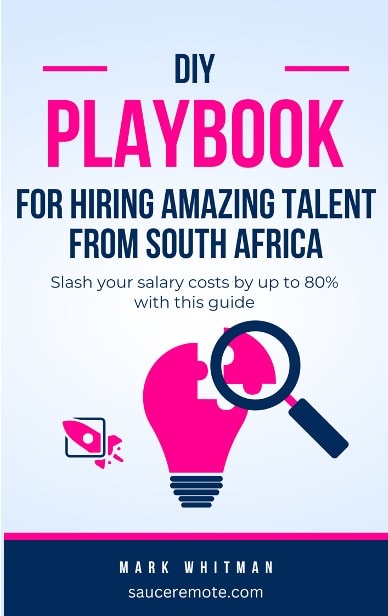How about expanding your team with Indonesian talent?
Indonesia's rapidly growing economy and youthful, skilled workforce make it an attractive destination for businesses looking to expand in Southeast Asia.
But how do you navigate the intricacies of Indonesian employment laws and cultural practices?
Enter the Employer of Record (EOR) in Indonesia.
In this article, we'll explore how partnering with an EOR in Indonesia can be your key to building a successful business.
Ready? Let's roll.

Discover how to slash your salary costs by 80%
Get our exact process for hiring amazing overseas talent from South Africa. Includes copy-and-paste templates and a detailed salary guide.
What Is an Employer of Record in Indonesia?
An Employer of Record in Indonesia is a third-party organisation that legally employs workers on your behalf and manages all local HR, payroll, and compliance matters.
Essentially, the EOR becomes the official employer, handling the administrative and legal responsibilities while you direct your team's daily activities and projects.
Pro tip: If you're still getting familiar with this concept, check out my guide, What Does EOR Stand For.
So, why do businesses choose to work with an EOR in Indonesia?
Here's the scoop:
- Quick Market Entry: Bypass the lengthy process of establishing a legal entity.
- Compliance Confidence: Navigate Indonesia's complex labour laws with expert assistance.
- Cost Savings: Reduce overhead and administrative burdens associated with setting up locally.
In essence, EOR services enable you to tap into Indonesia's market swiftly and compliantly, sidestepping the usual hurdles.
But what makes Indonesia's labour market unique, and how can an EOR help you thrive?
Let's unpack the details.
Hire remote talent from South Africa & slash salary costs by 80%
Salaries start from £8,000 per year!
The Indonesian Employment Landscape at a Glance
When I first considered hiring in Indonesia, I discovered the country has many, often complicated, labour laws designed to protect employees and maintain industrial relations.
While these regulations benefit workers, they can pose challenges for foreign companies unfamiliar with the local legal framework.
Here's what you need to know:
Working Hours and Overtime
In Indonesia, the standard workweek is either:
- 40 hours per week: 8 hours per day over 5 days, or
- 40 hours per week: 7 hours per day over 6 days.
Overtime Regulations:
- Overtime is permitted but cannot exceed 3 hours per day and 14 hours per week.
- Overtime must be agreed upon by both employer and employee.
Overtime Pay Rates:
- First hour: 1.5 times the hourly wage.
- Subsequent hours: 2 times the hourly wage.
For comprehensive guidelines, refer to the Indonesian Manpower Law No. 13 of 2003.
Compensation and Currency
The local currency is the Indonesian Rupiah (IDR).
Minimum Wage:
- Set annually by provincial and district governments.
- Varies depending on the region due to cost of living differences.
Common Compensation Practices:
- Religious Holiday Allowance (THR): Equivalent to one month's salary, paid prior to major religious holidays.
- Allowances: May include transportation, meals, and housing.
So, what about public holidays and annual leave policies in Indonesia? Let’s find out.
Hire remote talent from South Africa & slash salary costs by 80%
Salaries start from £8,000 per year!
Public Holidays and Annual Leave
Indonesia recognises 16 national public holidays, which may vary slightly yearly due to lunar calendars.
Employees are also entitled to 12 days of paid annual leave after one year of continuous employment.
Tax Obligations and Contributions
Understanding tax and social security contributions is crucial if you want to hire Indonesian workers. Here’s what you must know:
Income Tax
- Employers are responsible for withholding Personal Income Tax (PIT) from employees' salaries.
- Progressive tax rates range from 5% to 35% based on income levels.
Social Security Contributions
Indonesia's social security system is managed by BPJS Ketenagakerjaan (Employment) and BPJS Kesehatan (Health).
Employer Contributions:
- Old Age Security (JHT): 3.7% of gross salary.
- Work Accident Insurance (JKK): 0.24% to 1.74%, depending on risk.
- Death Insurance (JKM): 0.3%.
- Health Insurance: 4% of gross salary.
Employee Contributions:
- Old Age Security (JHT): 2% of gross salary.
- Health Insurance: 1% of gross salary.
Next, let's learn about the leave policies in Indonesia.
Hire remote talent from South Africa & slash salary costs by 80%
Salaries start from £8,000 per year!
Leave Policies and Parental Leave
Here’s what you should know about leave policies and parental leave in Indonesia:
Sick Leave
- Employees are entitled to sick leave with a doctor's note.
- Employers must pay full wages for the first 4 months of illness, with reductions thereafter.
Maternity Leave
- Female employees are entitled to 3 months of paid maternity leave, typically divided into 1.5 months before and after childbirth.
- Employers are required to pay full salary during maternity leave.
Paternity Leave
- Male employees are entitled to 2 days of paid leave for the birth of their child.
Probation and Termination Periods
Probation Period
- Maximum of 3 months.
- During probation, termination can occur without the usual notice requirements.
Notice Period for Termination
- Generally, 30 days' notice is required.
- Severance pay and other entitlements depend on the length of service and reason for termination.
Indonesia's labour laws emphasise employee rights, so strict compliance with regulations is essential to avoid legal issues.
Managing all these details might seem daunting, but that's where an Employer of Record in Indonesia becomes invaluable.
An EOR can help you manage these complexities, ensuring full compliance while you focus on growing your business.
Hire remote talent from South Africa & slash salary costs by 80%
Salaries start from £8,000 per year!
How to Choose the Right EOR in Indonesia
Selecting the perfect Employer of Record is critical to your success.
Here's what to look for:
1. Expertise in Indonesian Labour Laws
Your EOR should have:
- In-depth knowledge of local employment regulations.
- Experience with employment contracts, including permanent and fixed-term arrangements.
- Understanding of cultural norms and business etiquette.
2. Comprehensive Service Offering
Ensure the EOR provides:
- Payroll and Tax Management
- Compliance Monitoring
- HR Support and Employee Relations
- Legal Assistance
A full-service EOR can handle all administrative aspects, allowing you to concentrate on your core operations.
3. Transparent Pricing
To avoid surprises:
- Request a detailed breakdown of fees.
- Clarify what services are included.
- Inquire about any additional charges.
4. Customised Solutions
Your business is unique. The EOR should offer:
- Flexible services tailored to your industry and size.
- Ability to scale services as your team grows.
- Personalised support to meet your specific needs.
5. Strong Track Record
Do your due diligence by:
- Reading client testimonials.
- Asking for case studies or references.
- Verifying their experience in Indonesia.
6. Local Presence and Global Standards
An Indonesian EOR with a solid local team offers the following:
- Cultural insights for better employee engagement.
- Prompt support and responsiveness.
- Compliance with both local and international best practices.
And what do you do if all of this sounds like too much work? I've got the answer.
Hire remote talent from South Africa & slash salary costs by 80%
Salaries start from £8,000 per year!
Discover Other Labour Markets
While Indonesia offers immense potential, exploring other markets might align better with your strategic goals.
For example, South Africa presents a vibrant economy with a growing, native English talent pool.
If you want to hire South African employees, partnering with an experienced Employer of Record in South Africa can help.
Final Thoughts
And there you have it: Hiring employees in Indonesia doesn't have to be overwhelming.
By collaborating with a knowledgeable Employer of Record in Indonesia, you can confidently navigate the complexities of local employment laws and cultural nuances.
Focus on what you do best—growing your business—while your EOR handles the rest.
